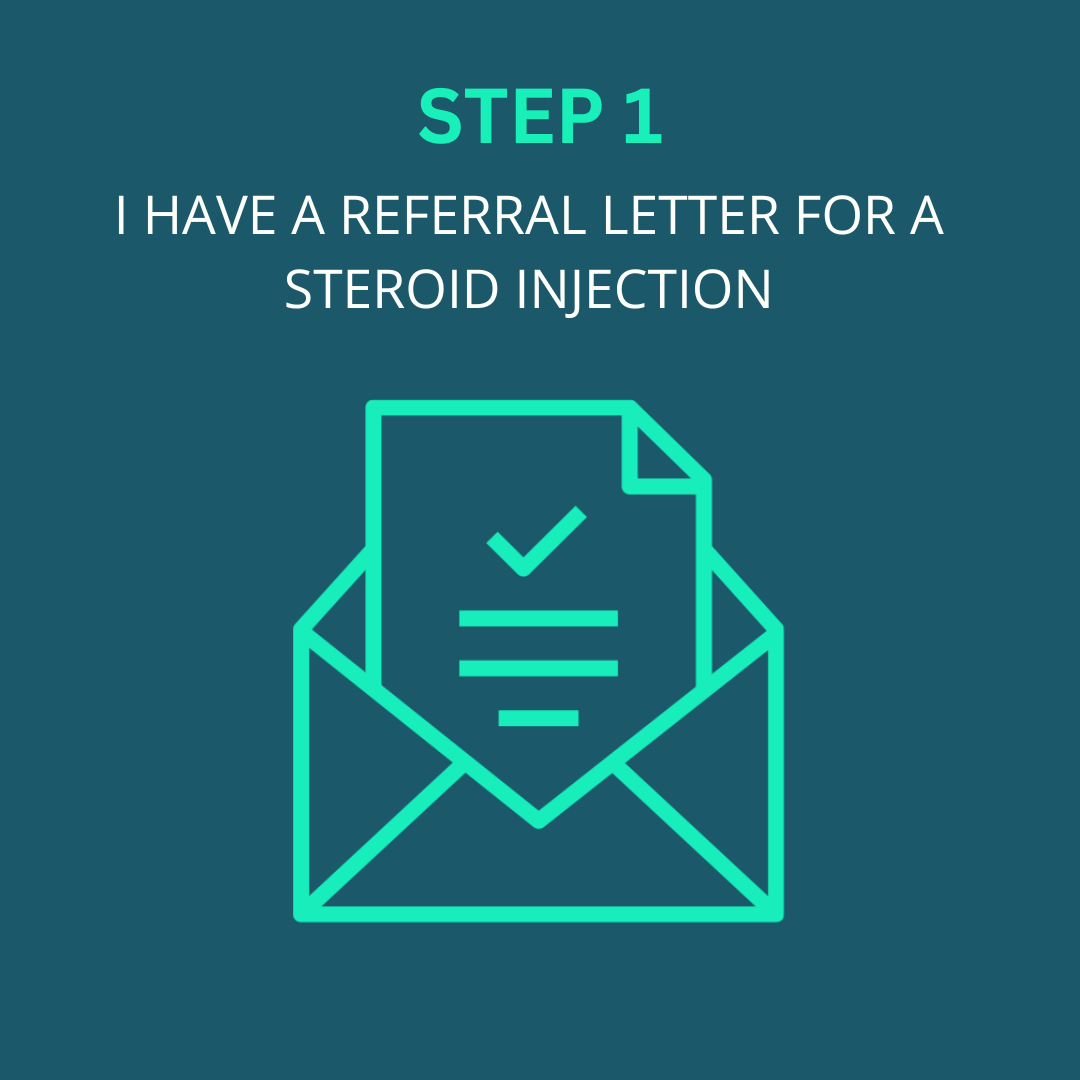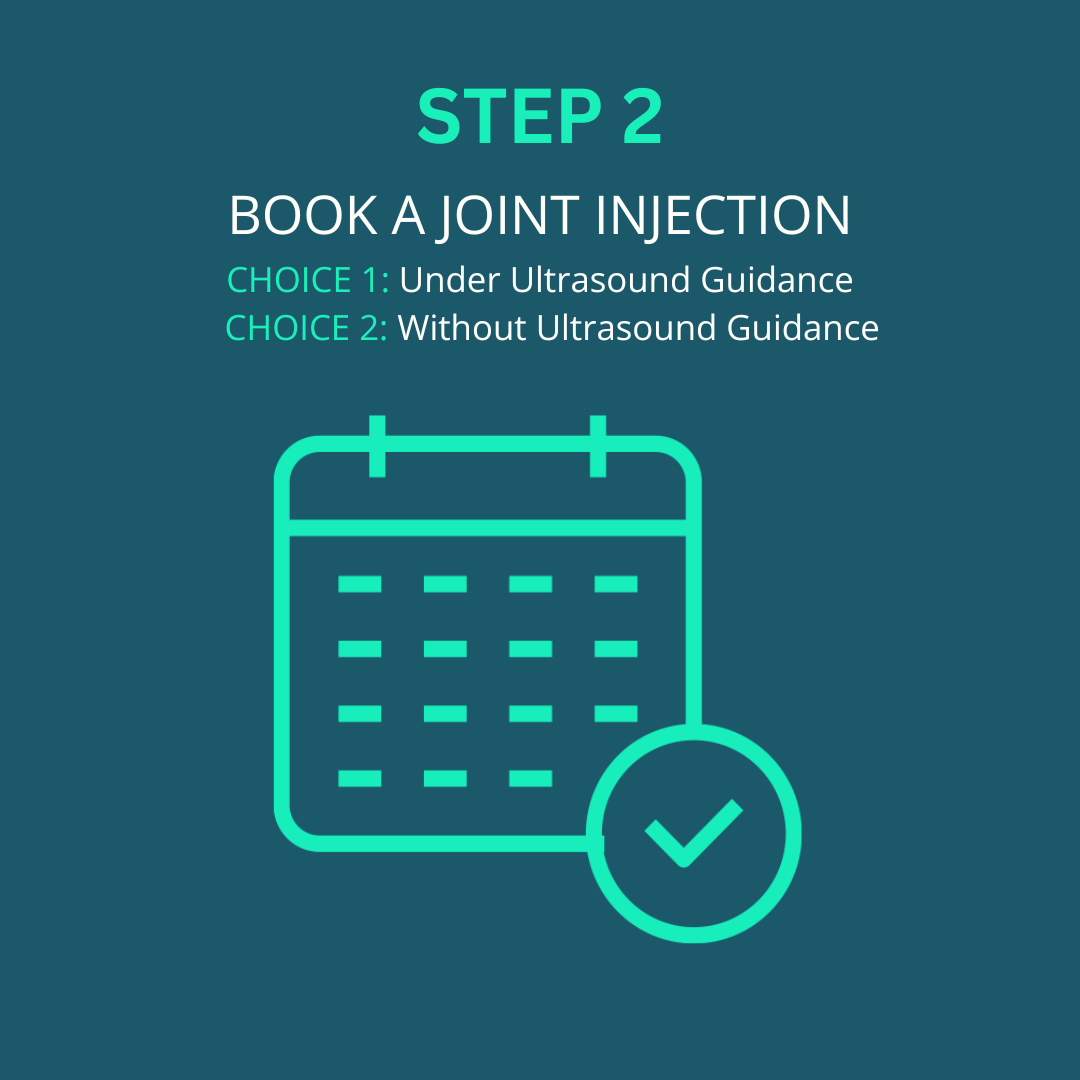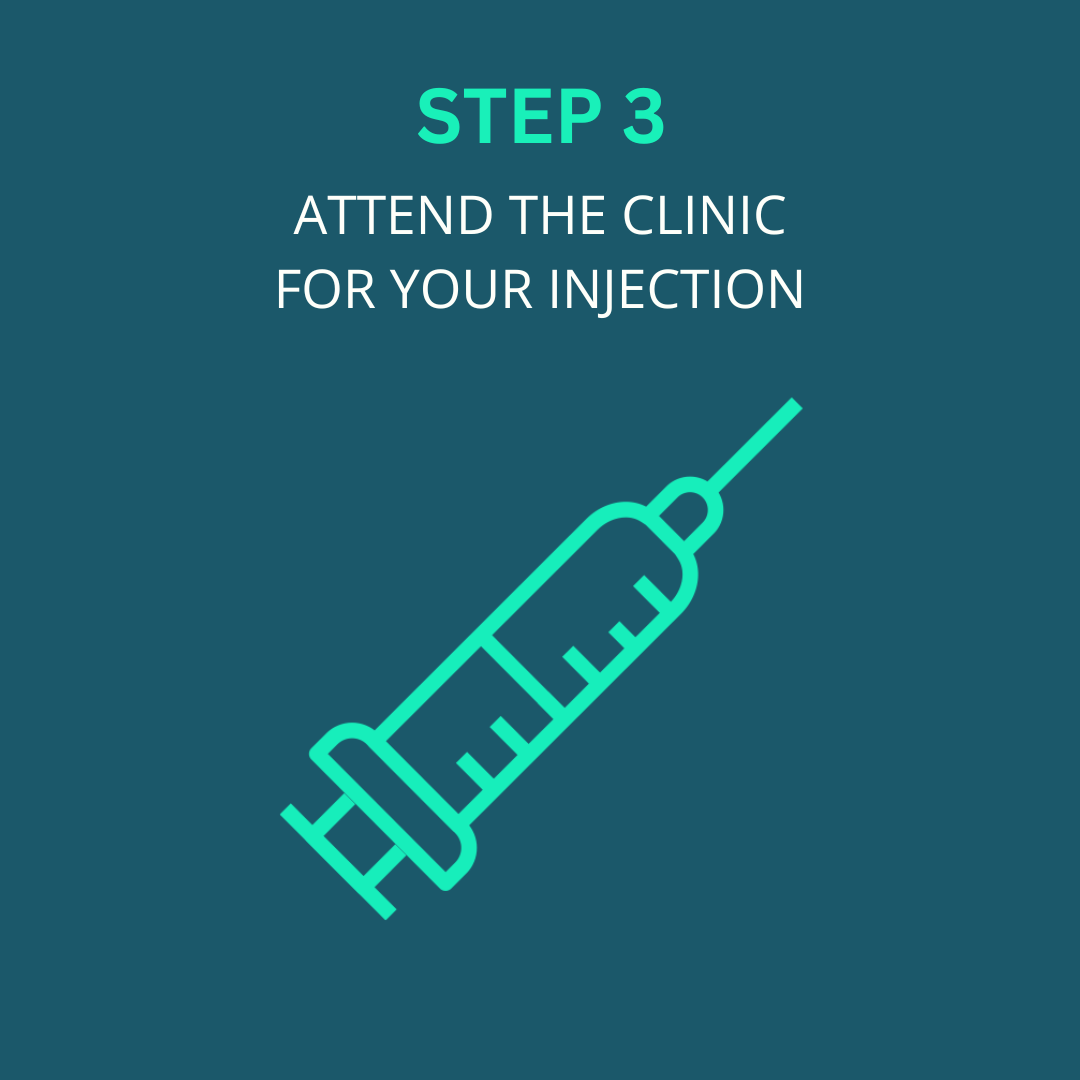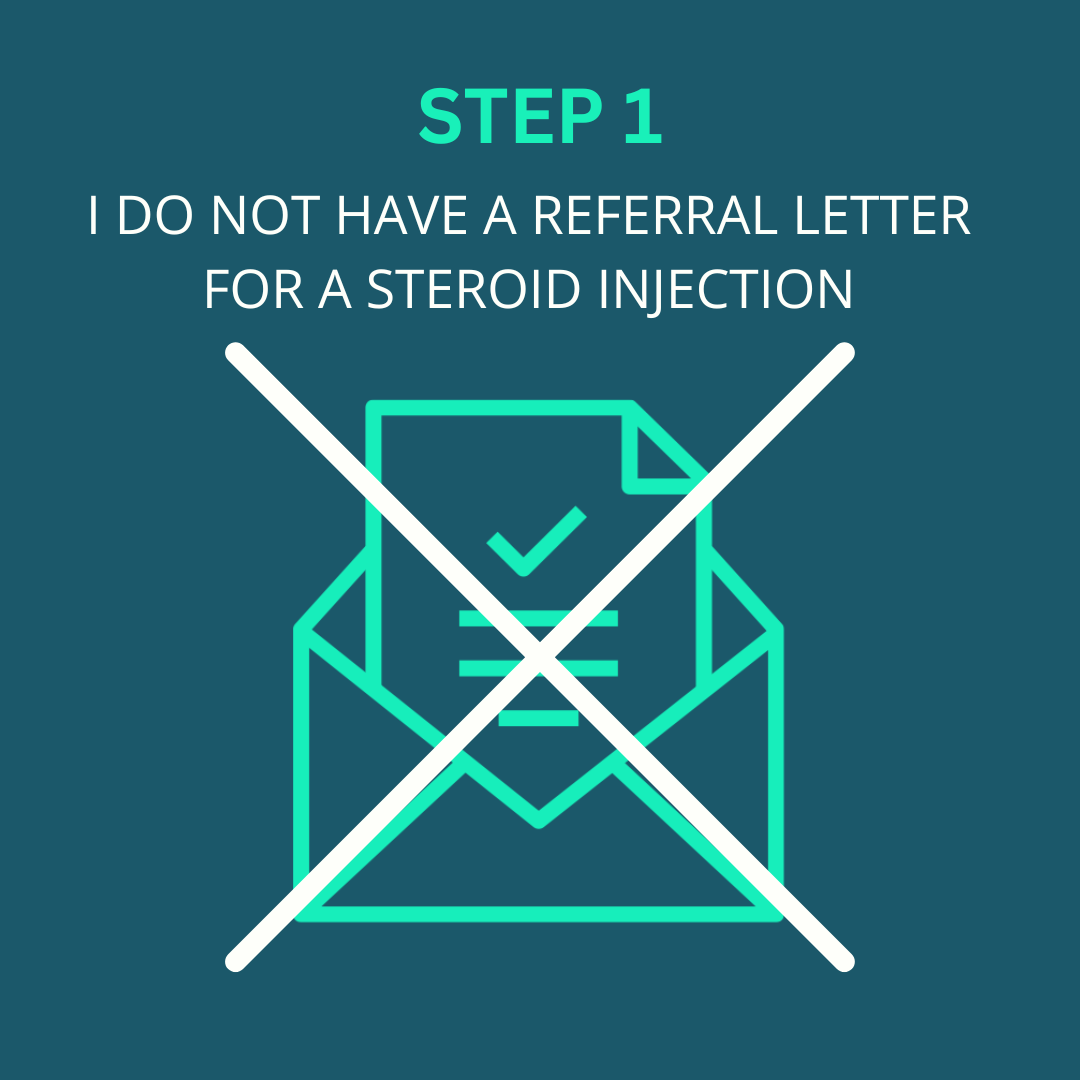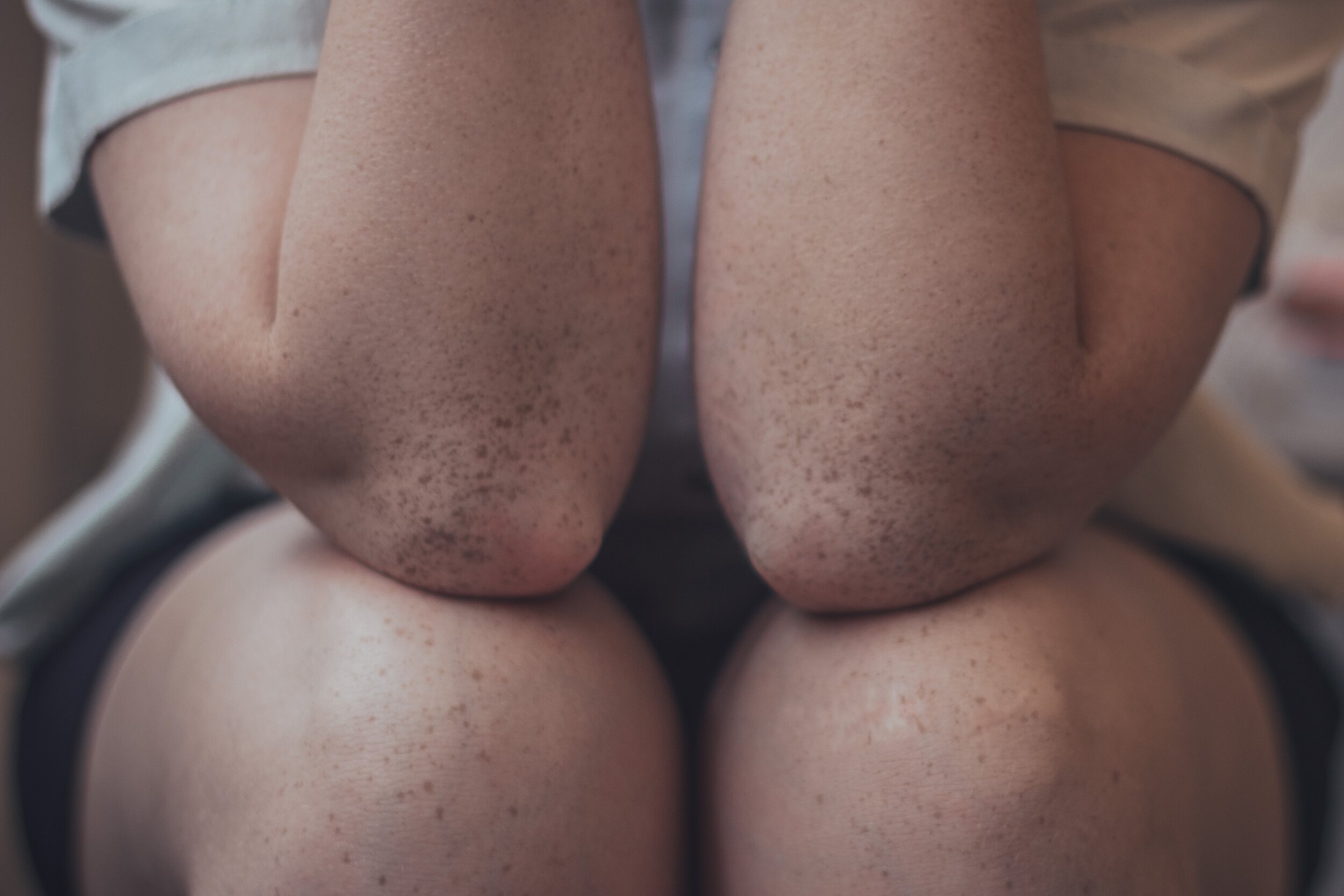Private steroid Joint Injection clinic Belfast
We offer cortisone joint injections both with ultrasound guidance for accuracy and without ultrasound guidance.
I have a referral letter for a joint injection.
Price £250
Price £350
PLEASE NOTE: If a second joint requires injection during the same appointment there is an additional fee of £150. If it is for multiple finger joints please email us for a price.
I do not have a referral letter for a joint injection.
Price £140
If you do not have a referral letter for your joint injection and have not been assessed already by a doctor or physiotherapist then Dr Graham, Dr Russell, or Dr McKeown, must see you for an initial examination and consultation.
Book a 30-minute initial consultation with the doctor to assess your joint or tendon problem including carpel tunnel.
We will assess your joints or tendons and discuss whether a steroid injection is suitable
We will also advise you on other therapies and on what exercises to do to improve your joint pain or tendon pain.
You may need an Xray of the joint or another type of scan before a steroid injection can be performed.
We can refer you into the NHS for your scans or investigations.
If a steroid injection is suitable we will do it that day if possible or book you in as soon as possible
Types of joint, tendon and nerve injections explained
JOint Injection Option 1
injection without Ultrasound guidance
30 minute appointment
Knee joint
Shoulder for bursitis
Trochanteric bursa (side of hip)
Tennis elbow
Golfers elbow
Plantar fasciitis
Carpal Tunnel injection
Price £250*
*If a second joint requires cortisone injection during the same appointment there is an additional fee of £150.
JOint Injection Option 2
injection with ultrasound guidance
60 minute appointment
Shoulder- both frozen shoulder and rotator cuff bursitis
Knee joint
Trochanteric bursa (side of hip)
Tennis elbow
Golfers elbow
Wrist joint
Ankle joint
Trigger finger
Finger joints
CMC /base of thumb joint
Plantar fasciitis
De Quervain’s Tenosynovitis
Carpal Tunnel injection- injection around the median nerve.
Peroneal tendon sheath ( outer ankle/foot)
Price £350*
*If a second joint requires steroid injection during the same appointment there is an additional fee of £150. For multiple finger joint injections please email us for a price.
What you need to know about steroid Joint Injection
This appointment requires an initial 30 minute consultation, if you haven’t seen someone before for your joint problem.
The GP will assess your painful joint or joints and decide if a steroid injection will benefit you. They may refer you for a scan of the joint, recommend some blood tests, also guide you with exercises to prevent the problem happening again.
We may also recommend you see a physiotherapist.
The most common reason to have a cortisone or steroid joint injection is severe debilitating pain that does not respond to medication or rubs, interferes with sleep and is getting worse despite other treatments such as physio therapy.
The British Society of Rheumatology have recently updated their guidance which you can read here. Guidelines vary between countries, but as with any cortisone injection either into a joint, tendon area or muscle, the potential risks and benefits should always be carefully considered.
Who can do joint injections?
Joint injections are also known as ‘Cortisone-injections’, or ‘Steroid-injections’.
They are performed by rheumatology doctors, orthopaedic surgeons, GP’s who have been trained in this procedure and also by some physiotherapists.
At Vitalis Health Dr Graham, Dr Russell, and Dr McKeown all perform these injections.
Dr Graham and Dr Russell do injections under USS guidance.
When do I need a steroid joint injection
One of the most common reasons to have a steroid joint injection is because of pain from arthritis of the joint, either Rheumatoid arthritis, osteoarthritis, or another type of inflammatory arthritis such as psoriatic arthritis.
Other reasons for a steroid injection are swelling or inflammation of a tendon that is not settling with physio and exercises, and pain where the muscle inserts into the bone such as Tennis or golfers Elbow.
Some people will have a bursitis or capsulitis which requires a steroid injection to settle inflammation.
Types of conditions that benefit from a cortisone injection
The steroid is used to reduce swelling and pain, and improve movement of the joint. If you have an inflammatory arthritis like rheumatoid then you will probably also take a medication to reduce inflammation, where a steroid injection is used only when there is s bad flare-up of your joint pains.
In the case of osteoarthritis, there is no licensed medication to reduce the disease progressing, although diet and exercise can help, so often a steroid injection is used to alleviate pain.
Tendon pain can be sudden (acute) or longstanding (chronic). Both these types respond very differently to steroid injections, but always need some amount of strengthening exercises to ensure the abnormal tendon changes into a healthier tendon with the correct stimulation.
Tennis and golfers elbow are not true tendon injuries, though they do respond similarly to both exercise and steroid injection.
De Quervains tenosynovitis is a common problem for woman who are either pregnant or have just given birth and it does respond well to a steroid injection.
Our GPs will assess you joint or tendon and decide on the best treatment plan. Sometime a steroid injection will do more harm than good and it is important to consider other options.
How long does the joint injection procedure take?
Most injections of the knee, elbow or shoulder take approximately 45 minutes to perform.
The first ten minutes are for asking you questions about your joints/tendons and your general health, then ten minutes to assess the joint to ensure an injection is suitable. After that if the procedure is necessary and you will benefit a consent form will be filled-out.
The area to be injected will be prepared so that it is clean and sterile. Iodine is used to clean the skin and allowed to dry for 5 minutes. The joint or tendon injection itself, takes ten minutes which allows for the local anaesthetic to work; however, if there is fluid in the joint this will be removed which can take an additional ten minutes.
Are joint injections painful?
Usually joint injections cause a little discomfort initially as the local anaesthetic is being injected, then after that you may feel some pressure only.
It is important to let your doctor know if you think the anaesthetic is not enough.
There can be some pain one hour after the injection when the local anaesthetic wears -off, but this is often minimal and sometimes there is no pain at all.
As infection is a rare but possible side-effect of a cortisone injection. you will be advised if you you have bad pain to let the doctor know.
who will perform my joint or tendon injection?
We have 3 GPs who can perform joint injections in the clinic.
Dr Graham has been performing joint injections since 2004 when she first worked in rheumatology, and has now performed over 1000 injections. She has maintained her skills in joint injections while working as a GP, alongside good relations with her rheumatology colleagues and can recommend prompt onward care.
Dr Graham also has a special interest in Sports Medicine and will help guide you in your rehabilitation with posture correction if needed and relevant exercises.
Dr Tim Russell and Dr Rory McKeown are also highly skilled in performing joint injections.
If a joint injection is not needed, either because it may not help or in some cases could cause other problems, our GPs will explain this to you and offer an alternative treatment. A consultation fee of £140 will be charged.
For injections of the hip or the back, we will refer you to have this done under X-ray or Ultra-sound guidance.
Side-effects of a steroid joint injection
Steroid injections can thin-out the joint lining and in some cases result in an infection of the joint, or more rarely collapse of the joint structure if there is severe arthritis underlying.
Other side effects are pain after the procedure once the local anaesthetic wears off, and very rarely you can paradoxically develop a flare-up of your arthritis due to the steroid crystallising in the joint.
Steroid or cortisone injected into the joint is absorbed by the rest of your body and can theoretically increase your risk of other infections if high doses are used.
Each person responds differently to steroid. Rarely, steroid can cause the adrenal glands where your natural steroid is produced to stop doing their job which can increase your risk of infection if this is not picked-up by your doctor.
Side-effects of a tendon-injection
Not all tendons benefit from a steroid injection and in some cases if the tendon is weak and stiff from chronic inflammation the steroid injection can result in the tendon breaking or tearing.
It is important to be properly assessed by your doctor to decide if an injection is likely to benefit you and to weigh up the possible side-effects.
In some cases an X-ray of the joint is required first and our GPs will refer you for this if needed. (You can usually have the X-ray performed that day in Belfast).
WHAT HAPPENS AFTER MY JOINT INJECTION?
The doctor will explain the following and send you an after care information sheet by email.
Rest the joint or tendon for 24 hours
Some people will have a flare in their condition due to the steroid initially irritating the area, this lasts usually for 24 hours.
off-load the joint or tendon for the first week, then gradually start your rehab exercises
Strengthening exercises and postural changes can help offload a joint and strengthen the support around it.
Sometimes we recommend a splint support as for carpel tunnel or De Quervain’s tenosynovitis.
For OA (osteoarthritis) along with strengthening, we may suggest some supplements and insoles for flat feet if you have hip of knee arthritis.
For tendonitis we will recommend strengthening exercises and biomechanical adjustments along with green tea to help reduce inflammation. Shock wave therapy can be useful for achilles tendonitis or tennis elbow.
Dr. Graham’s experience in Rheumatology
Dr Graham first worked in the specialty of Rheumatology in 2004 as a Staff grade in Antrim Area Hospital, then again in 2007 as a Rheumatology Registrar in the Leicester Royal Infirmary and in Antrim Area as a staff grade in 2008.
Finally while still working as a GP, she returned to rheumatology In 2015 to work in Musgrave Park Hospital, Belfast as a staff Grade doctor in rheumatology. During this time she set the foundations for her research in Sport and exercise medicine and the following year she was granted approval to carry out research into the effects of exercise on women with rheumatoid arthritis.
Her research was conducted through Musgrave park hospital rheumatology department, and in 2016 she obtained her Masters degree in Sport & Exercise Medicine, graduating from the university of Bath.
Dr Russell’s experience in joint injections
Dr Russell has been doing joint injections for over 18 years. He uses the anatomy landmarks to guide his injection and is confident with knee steroid injections, carpel tunnel, tennis elbow and shoulder injections.
This year he will train to perform injections under ultrasound guidance.
Dr McKeown’s experience in joint injections
Dr McKeown performs injections of the knee and shoulder with landmark guidance
Dr McKeown was an A&E doctor for some years before becoming a GP and so has experience in taking fluid off swollen knees and also performing knee cortisone injections.



